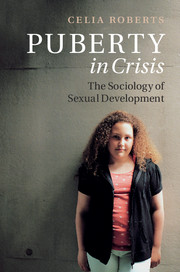Book contents
- Frontmatter
- Dedication
- Contents
- List of figures
- Acknowledgements
- 1 Puberty in crisis? Sex, reproduction and the loss of future
- 2 Articulating findings, feelings and figurations: methods and approaches
- 3 Telling histories: the scientific study of puberty
- 4 Defining early onset puberty: troubling findings about sexual development
- 5 Causes and explanations: genes, fat, toxins and families
- 6 Consequences of early development: sex, drugs and shortness
- 7 Treatments: pharmaceuticals, sex and suffering
- Conclusion: Folding puberty differently: changing findings, feeling and figurations
- References
- Index
6 - Consequences of early development: sex, drugs and shortness
Published online by Cambridge University Press: 05 August 2015
- Frontmatter
- Dedication
- Contents
- List of figures
- Acknowledgements
- 1 Puberty in crisis? Sex, reproduction and the loss of future
- 2 Articulating findings, feelings and figurations: methods and approaches
- 3 Telling histories: the scientific study of puberty
- 4 Defining early onset puberty: troubling findings about sexual development
- 5 Causes and explanations: genes, fat, toxins and families
- 6 Consequences of early development: sex, drugs and shortness
- 7 Treatments: pharmaceuticals, sex and suffering
- Conclusion: Folding puberty differently: changing findings, feeling and figurations
- References
- Index
Summary
Early development is considered an adverse effect because of its impact on outcomes in adolescence, such as accelerated skeletal maturation and short adult height, unwanted pregnancies, sexually transmitted infections, and psychosocial difficulties, and because of its potential impact on adult diseases such as breast cancer and elements of the metabolic syndrome.
(Hiatt et al. 2009: 1815)Across the global North, sexually developing female bodies are culturally troubling. Adolescent girls’ desire for new sexual experiences and potential to become pregnant are framed as problems requiring management through education, regulation and biomedicalisation (most notably via hormonal contraception). The reproductive capacities that are initiated in many – although not all – women at puberty are, like sexual intercourse, widely figured as something that should be ‘saved for later’, fulfilled only at an appropriate time. In biomedical and popular discourses such concerns also enact particular forms of sex/ gender, class and race: different worries become attached to particular kinds of bodies.
Most feminist research in this area addresses public debates around teenage pregnancy, birth and parenting, sometimes undertaking empirical work with young women in order to produce critical counter-narratives in the face of significant misogyny and ‘class disgust’, to use Imogen Tyler's (2008) term. In her classic book Feminism and Youth Culture (1991), for example, Angela McRobbie tells stories about teenage mothers living in a deprived area of south Birmingham. Unlike the selfish or ignorant victims portrayed in news media and reviled in television comedy (Tyler 2013), McRobbie's research participants are resourceful young women trying to get by in the face of severely limited opportunities for employment, education, and physical and social mobility. Spending time with these women and their families, McRobbie notes that ‘motherhood had pushed them towards a precocious maturity’; a maturity denied to their male partners who were unable to find paid employment (McRobbie, 1991: 227; see also Sharpe 1984). This experience of achieving maturity through motherhood is highly classed: the bodies of middle-class girls in contrast, as Walkerdine, Lucey and Melody's (2001: 215) interview-based research shows, have ‘to be regulated at all costs’ in order to avoid pregnancy and birth: indeed, pregnant middle-class teenagers are more likely to have an abortion than their working-class counterparts.
- Type
- Chapter
- Information
- Puberty in CrisisThe Sociology of Early Sexual Development, pp. 167 - 196Publisher: Cambridge University PressPrint publication year: 2015



